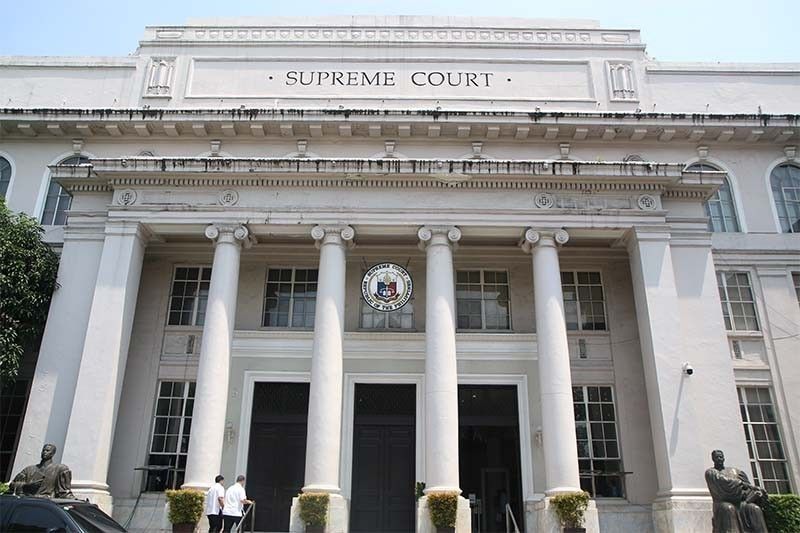SC: Aetas' plea to join petitioners vs anti-terrorism law junked due to pending case

MANILA, Philippines — The Supreme Court dismissed a plea by 2 Aeta farmers to join the petitions against the Anti-Terrorism Act due to the pendency of a separate case against them under that law in a different court.
SC spokesperson Brian Hosaka told reporters Wednesday that Chief Justice Diosdado Peralta explained that the Japer Gurung and Junior Ramos Petition-in-Intervention was dismissed “because there is already a pending case before the trial court.”
Hosaka said the chief justice did not provide other details.
Gurung and Ramos are facing charges for alleged violation of the anti-terrorism law. They are the first known case of the controversial law, and was referred to by Associate Justice Marvic Leonen in oral arguments as being “maybe the actual case” against the ATA.
At the resumption of debates on Tuesday, Solicitor General Jose Calida made an urgent manifestation saying government lawyers aretaking over the defense of Gurung and Ramos.
Since September 2020, they had been represented by the National Union of Peoples’ Lawyers regional chapter in Central Luzon.
Calida said that the Aeta farmers were withdrawing their petition that he alleged they were “forced to sign”. Calida said the two were even given P1,000 to divide among themselves in exchange.
NUPL has denied the allegations.
The solicitor general said Gurung and Ramos subscribed to their affidavit before lawyers of the Public Attorney’s Office and endorsed by the National Commission on Indigenous Peoples in Zambales.
NUPL manifestation
The two Aetas’ case was first brought to the SC’s attention in November 2020, through a manifestation filed by the progressive groups that the NUPL represents.. The petitioners were then urging the SC to issue a temporary restraining order or a status quo ante order to temporarily halt the implementation of the anti-terrorism law.
Citing the Aetas' case and the incidents of red-tagging of government officials, the reiterated their "prayers for injunctive reliefs and the nullification of the Anti-Terrorism Act as well as its Implementing Rules and Regulations, which have all become even more urgent and imperative."
The SC however had included the issuance of a TRO or SQAO among the topics to be discussed in the oral arguments. The court had said it will defer action on petitioners' prayer for injunctive relief until the end of the debates.
But Gurung and Ramos had moved to join the legal fight against the law on February 2, just as the SC started its oral arguments.
Questions raised: Why now? Who benefits from this?
Calida’s move, although of no bearing since the SC had already denied the petition, elicited questions from groups that are also petitioners against the anti-terrorism law.
Rights alliance group Karapatan noted that Gurung and Ramos had been represented by the NUPL since they were charged
“Why now? … Is it because the case of Gurung and Ramos and the suffering they endured will inevitably become the centerpoint of the oral arguments on the terror law—such that their case shows concretely the law’s danger and why it should be junked?” the group added.
They also echoed the NUPL’s point on the improbability of lawyers coercing Gurung and Ramos to sign the petition since the farmers were detained in a government facility.
“The most important question would be: who benefits from this withdrawal of the petition for intervention? The answer is quite apparent—only those raring to use the draconian law with the intent to infringe on rights and liberties and quash political dissent will have the most to gain from this sleazy act,” Karapatan added.
Sandugo-Movement of Moro and Indigenous Peoples for Self-Determination also backed the NUPL.
“They will not change their position without external pressure,” Sandugo said of the two farmers.
The group also raised doubts over the participation of the NCIP in the case. Sandugo and other IP groups previously criticized the agency for seeming to side with corporations in talks on Free and Prior Informed Consent, which is required for projects and business ventures on ancestral domain.
RELATED: Dumagat leader disputes MWSS claim of community support for Kaliwa Dam
Kapatid, an advocacy group for political prisoners, meanwhile called on the SC to investigate and take action on the government move, which they recalled also happened in 2019 in the case of fisher folk in Zambales.
Calida previously presented affidavits to the SC of 19 fisherfolk claiming they were “deceived” into signing a petition seeking the issuance of a writ of Kalikasan over parts of the West Philippine Sea.
Kapatid spokesperson Fides Lim said that Calida should even be made to resign “because no People’s Tribune should be allowed to get away with what he has been doing to debase a high position of trust.”
- Latest
- Trending

































